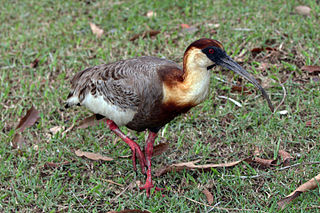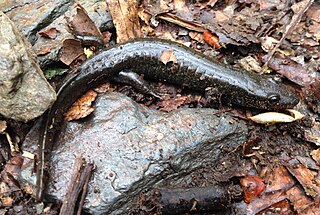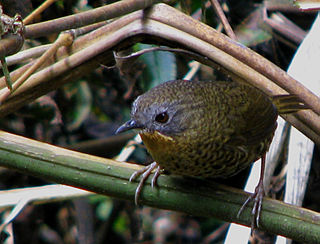
The long-tailed tit, also named long-tailed bushtit, is a common bird found throughout Europe and the Palearctic. The genus name Aegithalos was a term used by Aristotle for some European tits, including the long-tailed tit.

The snailfishes or sea snails, are a family of marine ray-finned fishes. These fishes make up the Liparidae, a family classified within the order Scorpaeniformes.

Amaranthus caudatus is a species of annual flowering plant. It goes by common names such as love-lies-bleeding, pendant amaranth, tassel flower, velvet flower, foxtail amaranth, and quelite.

The Barbados Black Belly is a breed of domestic sheep from the Caribbean island of Barbados. It is raised primarily for meat. Unlike most tropical sheep, it is highly prolific, with an average litter size of approximately 2.

The blackbelly lanternshark or lucifer shark is a shark of the family Etmopteridae found around the world in tropical and temperate seas at depths between 150 and 1,250 meters – the mesopelagic zone. Compared to other mesopelagic fish predators and invertebrates, the blackbelly lanternshark is thought to reside in shallower, more southern waters. E. lucifer can reach up to 47 centimeters in length and consumes mesopelagic cephalopods, fish, and crustaceans. Blackbelly lanternsharks are bioluminescent, using hormone controlled mechanisms to emit light through ventral photogenic organs called photophores and are presumed to be ovoviviparous. The blackbelly lanternshark has been classified as "Not Threatened" within the New Zealand Threat Classification System.

The long-tailed goral or Amur goral is a species of ungulate of the family Bovidae found in the mountains of eastern and northern Asia, including Russia, China, and Korea. A population of this species exists in the Korean Demilitarized Zone, near the tracks of the Donghae Bukbu Line. The species is classified as endangered in South Korea, with an estimated population less than 250. It has been designated South Korean natural monument 217.
Gilbert Percy Whitley was a British-born Australian ichthyologist and malacologist who was curator of fishes at the Australian Museum in Sydney for about 40 years.

The buff-necked ibis, also known as the white-throated ibis, is a fairly large ibis found widely in open habitats of eastern and northern South America. It formerly included the similar black-faced ibis as a subspecies, but that species is almost entirely restricted to colder parts of South America, has a buff lower chest, and lacks the contrasting large white wing-patches.
Niceforonia elassodiscus is a species of frog in the family Strabomantidae found in Colombia and Ecuador. Its natural habitat is subtropical or tropical moist montane forests. It is threatened by habitat loss.

The blackbelly salamander is a species of salamander in the family Plethodontidae. It is endemic to the United States. Its natural habitats are rivers, intermittent rivers, and freshwater springs. It is threatened by habitat loss.

The rufous-throated wren-babbler is a species of bird in the family Timaliidae. It is found in Bhutan, India, and Nepal.

Careproctus is a genus of snailfishes found in benthic and benthopelagic habitats in the Atlantic, Pacific, Arctic and Southern Oceans. Whether they truly are absent from the Indian Ocean is unknown and might be an artifact of limited sampling. They range from shallow coastal seas in the far north of their range to the abyssal zone, at depths of 6 to 5,459 m (20–17,910 ft). In the Northern Hemisphere they mostly live shallower than Paraliparis, but this pattern is reversed in the Southern Hemisphere. Although almost entirely restricted to very cold waters, a single species, C. hyaleius, lives at hydrothermal vents.

Helicolenus dactylopterus, blackbelly rosefish, bluemouth rockfish, and bluemouth seaperch, is a species of marine ray-finned fish belonging to the subfamily Sebastinae which is classified within the family Scorpaenidae. This Atlantic species is a typical sit-and-wait predator with a highly cryptic coloration.

Elassodiscus is a genus of marine ray-finned fishes belonging to the family Liparidae, the snailfishes. These fishes are found in the Pacific Ocean.
Peter Robert Last is an Australian ichthyologist, curator of the Australian National Fish Collection and a senior principal research scientist at CSIRO Marine and Atmospheric Research (CMAR) in Hobart, Tasmania. He is an elasmobranch expert and has described many new species of shark.
Houornis is a genus of enantiornithean birds from the Jiufotang Formation of Liaoning, People's Republic of China. It is known from a single species, Houornis caudatus, which had been once been classified as a species of Cathayornis, and has also been regarded as a nomen dubium.

Lepidopus is a genus of cutlassfishes.

Priapulus caudatus known as the cactus worm, is a marine invertebrate belonging to the phylum Priapulida. It is a cylindrical, unsegmented worm which burrows in soft sediment on the seabed. It has a circumpolar distribution.

Elassodiscus tremebundus, the dimdisc snailfish, is a species of snailfish which is found in the Pacific Ocean, specifically in the Bering Sea, Sea of Okhotsk, Aleutian Islands, eastern coast of Kamchatka, Kuril Islands, and Hokkaido, Japan.













